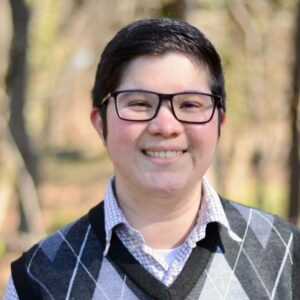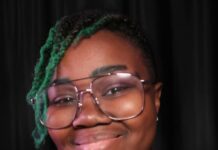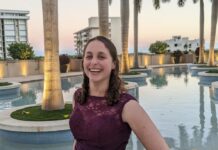
Ellen Braunstein
Less than a year out of rabbinical college, Asher Sofman is the coordinator of the Justice, Equity, Diversity and Inclusion program for the governing body of the Reconstructionist movement.
The 34-year-old transgender rabbi joined Reconstructing Judaism in late November, knowing that the movement, based in Wyncote, has long been dedicated to “having a full and rich and welcoming space for all Jews.”
His position was created to support congregations and havurot in making JEDI initiatives happen.
Sofman grew up in the Reconstructionist movement, the son of mixed-race parents. His mother is from the Philippines and his father is an American-born Jew. They raised Sofman and his brother Andrew in South Florida. His mother converted to Judaism.
His parents tried a few synagogues before settling on a Reconstructionist congregation, Temple Ramat Shalom. There, they didn’t feel merely tolerated or needed to fight for acceptance.
“It felt like home — like they could raise us kids as part of that community,” Sofman said.
Sofman attended the Jewish Reconstructionist Federation’s Camp Havaya in South Sterling, Pennsylvania.
“Growing up, I had no idea that the Reconstructionist movement was so radical and that my experience in Jewish environments was so different from that of many other Jews of color, LGBTQ or gender non-conforming Jews whose immediate or extended families weren’t all Jewish.”
He was also aware that his background, his physical looks and his gender identity were unique.
“But I had no question that I belonged. I knew I did,” he said. “I had no question that the spaces created by the people around me were created for me, for my family and for others like us.”
Sofman works with organizations all over the world that “are aligned with the values of justice, equity, diversity and inclusion — so they can do tikkun olam in the way that feels authentic to them.”
Sofman thinks the biggest challenge in the inclusion movement is people with disabilities, which he is now focused on. “They have largely been left out of the conversation.”
Reconstructionist Jews are encouraged to be open minded about other people’s beliefs, practices and values.
“It allows us to explore and innovate ritually in thought with forms of social justice that we engage in,” he said.
Reconstructionism’s defining feature is a dedication to peoplehood, more than to just a religion or just a nation, Sofman said.
“There’s this idea of creating belonging through the ways we act and through making decisions together in a very deliberate way that brings in the values we know are important,” he said.
The Reconstructionist movement was early in welcoming LGBTQ individuals. Rabbi Deborah Waxman, president and CEO of Reconstructing Judaism, is the first woman and first lesbian to lead a major Jewish religious movement and seminary.
“In my experience, a lot of gender nonconforming rabbinical students came to RRC because it was more welcoming than other seminaries they might be looking at,” Sofman said.
Sofman is one of the first two Americans of Asian descent to graduate from RRC.
Sofman is married and attends Nafshenu, a small reconstructionist synagogue in Cherry Hill.
His path to the rabbinate was not easy. He is a graduate of Brown University where he majored in the literary arts.
“After I graduated, I was struggling for a bit to figure out what I wanted to do with my post-student life,” he said.
He moved to the Bay Area in California seeking a queer liberal community. He worked for a tech company in their customer service department. Upon his return to Florida, he worked for the Holocaust Documentation and Education Center as an administrative assistant. He also volunteered to transcribe oral histories and reviewed handwritten letters, some in Yiddish.
“It showed me the fullness of the Jewish lives that were impacted and destroyed by the Holocaust,” he said.
The pursuit of a rabbinical ordination began with a conversation he had with his father while driving.
“I was in the car with my dad, and he asked me, ‘Well, didn’t you want to be a rabbi? What happened to that idea?’ I looked at him and I said, ‘Did I say that?’”
After camp one year, he did tell his dad he wanted to be a rabbi, but he was probably joking. Nevertheless, the idea stuck.
Sofman was drawn to a combination of things he liked doing: studying, reading, literary and linguistic analysis, and singing. “Not all rabbis do but for me, there’s a musical component to prayer.”
He also liked helping people.
Sofman applied to the RRC shortly after that conversation with his father.
“I would call it a calling. I realized that I felt how important and meaningful the work of spiritual care was to me,” said Sofman, who did chaplaincy work in his internships and part-time positions. “That to me was transformative in my own spiritual understanding of how the world is connected, how people are connected.”
Ellen Braunstein is a freelance writer.







I will vouch for the singing ability.. as a teen I remember that passion shown. Proud to know you!!!